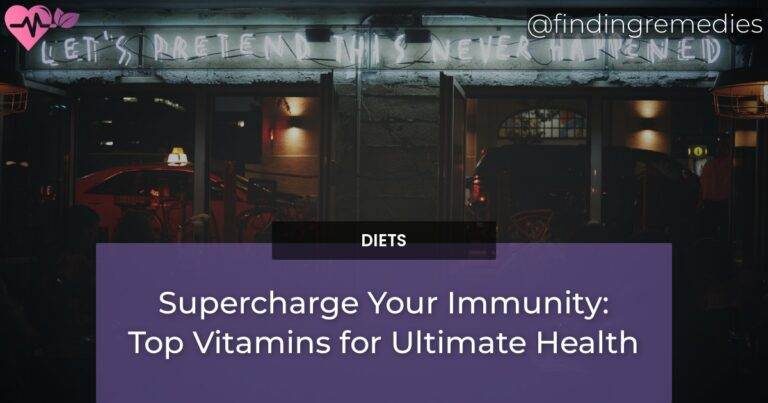The immune system plays a crucial role in protecting the body from infections and diseases. A healthy immune system requires a balanced diet rich in vitamins and minerals that support its function.
In this article, we will explore the benefits of some of the most important immune-boosting vitamins for optimal health.
Table of Contents
Vitamin C
Vitamin C is an essential nutrient that plays a vital role in the immune system. It helps to stimulate the production of white blood cells and antibodies, which are necessary for fighting infections and diseases. Here are some key points about Vitamin C:
- Vitamin C is a powerful antioxidant that helps to protect the body from oxidative stress.
- Some of the best dietary sources of Vitamin C include citrus fruits, kiwi, strawberries, and bell peppers.
- The recommended daily intake of Vitamin C is 75mg for women and 90mg for men.
- Consuming too much Vitamin C can lead to digestive discomfort, while too little can cause scurvy, a rare but serious condition.
Vitamin D
Vitamin D is another essential nutrient that is crucial for immune health. It helps to regulate the immune system and prevent infections and diseases. Here are some key points about Vitamin D:
- Vitamin D is produced by the body when the skin is exposed to sunlight.
- Some of the best natural sources of Vitamin D include fatty fish, egg yolks, and fortified milk and cereal.
- The recommended daily intake of Vitamin D is 600-800IU.
- People who are at risk of Vitamin D deficiency include those who live in northern latitudes, those with dark skin, and those who spend little time outdoors.
Vitamin E
Vitamin E is a powerful antioxidant that helps to protect the body from oxidative stress and support immune function. Here are some key points about Vitamin E:
- Vitamin E is found in a variety of foods, including nuts, seeds, and green leafy vegetables.
- The recommended daily intake of Vitamin E is 15mg for adults.
- Consuming too much Vitamin E can interfere with blood clotting, while too little can lead to nerve damage.
Vitamin B6
Vitamin B6 is essential for immune function and the production of antibodies. Here are some key points about Vitamin B6:
- Vitamin B6 is found in a variety of foods, including fish, poultry, and bananas.
- The recommended daily intake of Vitamin B6 is 1.3mg for adults.
- Consuming too much Vitamin B6 can lead to nerve damage, while too little can cause anemia and other health problems.
Vitamin A
Vitamin A is essential for the development of immune cells and the maintenance of healthy skin and mucous membranes. Here are some key points about Vitamin A:
- Vitamin A is found in a variety of foods, including liver, sweet potatoes, and carrots.
- The recommended daily intake of Vitamin A is 900mcg for men and 700mcg for women.
- Consuming too much Vitamin A can lead to toxicity, while too little can cause night blindness and other eye problems.
Folate
Folate is essential for the production of immune cells and the prevention of birth defects. Here are some key points about Folate:
- Folate is found in a variety of foods, including leafy green vegetables, beans, and fortified cereal.
- The recommended daily intake of Folate is 400mcg for adults.
- Consuming too much Folate is generally not a concern, while too little can cause anemia and other health problems.
Iron
Iron is essential for immune function and the growth of immune cells. Here are some key points about Iron:
- Iron is found in a variety of foods, including red meat, poultry, and beans.
- The recommended daily intake of Iron is 8mg for men and 18mg for women.
- Consuming too much Iron can lead to toxicity, while too little can cause anemia and other health problems.
Selenium
Selenium is a powerful antioxidant that helps to fight infections and diseases. Here are some key points about Selenium:
- Selenium is found in a variety of foods, including seafood, Brazil nuts, and mushrooms.
- The recommended daily intake of Selenium is 55mcg for adults.
- Consuming too much Selenium can lead to toxicity, while too little can cause muscle weakness and other health problems.
Zinc
Zinc is essential for immune health and the production of white blood cells. Here are some key points about Zinc:
- Zinc is found in a variety of foods, including oysters, beef, and pumpkin seeds.
- The recommended daily intake of Zinc is 11mg for men and 8mg for women.
- Consuming too much Zinc can interfere with the absorption of other minerals, while too little can lead to immune dysfunction and other health problems.
Vitamin B12
Vitamin B12 is essential for immune function and the production of red blood cells. Here are some key points about Vitamin B12:
- Vitamin B12 is found in a variety of foods, including meat, dairy products, and fortified cereal.
- The recommended daily intake of Vitamin B12 is 2.4mcg for adults.
- Consuming too much Vitamin B12 is generally not a concern, while too little can cause anemia and other health problems.
Ensuring that your diet is rich in these immune-boosting vitamins is an important step in maintaining a healthy immune system. However, it is important to remember that a balanced diet is just one part of an overall healthy lifestyle that includes regular exercise, stress management, and adequate sleep.

